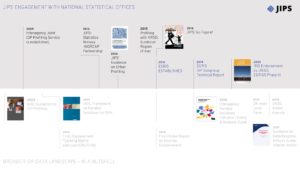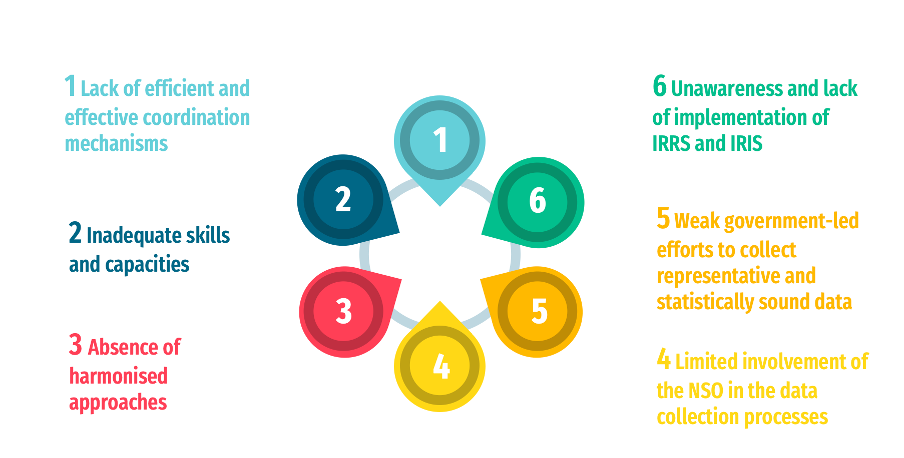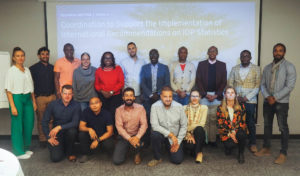In recent years, we have seen increasing attention on making official statistics and other data sources more inclusive. The ‘Leave No One Behind’ agenda propelled a push to fill key data gaps and to make the most vulnerable visible in data, enabling more targeted and equitable services and sustainable development.
“There is a famous saying, […] and I’m sure you have heard this before, that ‘who is not counted, does not count’. […] The importance of strengthening official statistics on Internally Displaced Persons by including them, first of all, in national statistical systems cannot be underestimated.”
– Cecilia Jimenez-Damary, UN Special Rapporteur on the human rights of IDPs, at the JIPS-EGRISS virtual conference 2020
However, we still have a long way to go when it comes to effectively including forcibly displaced people, such as refugees and Internally Displaced Persons (IDPs), in national official statistics. It remains critical to support efforts to implement international frameworks such as the International Recommendations of Refugee Statistics (IRRS) and IDP Statistics (IRIS), and to generate and streamline best practices among actors of the National Statistical System (NSS) across displacement contexts.
Importantly, it has become clear from JIPS’ work with National Statistical Offices (NSOs) as well as our engagement in the Expert Group on Refugee, IDP and Statelessness Statistics (EGRISS): well-functioning, formal coordination structures as well as the involvement of the National Statistical Systems (NSS) in data collection processes relevant to Internally Displaced Persons and refugees are key.
Read on to learn more about JIPS’ work on IRIS implementation through EGRISS, including lessons learnt from capacity development efforts in Africa and the Americas, implemented together with the Expert Group’s Subgroup 2 co-leads (Côte d’Ivoire, IOM and UNHCR), and as lead organisation providing support to the Government of Somalia to establish a statistical framework for internal displacement.
JIPS’ ENGAGEMENT IN THE EGRISS
The multi-stakeholder Expert Group on Refugee, IDP and Statelessness Statistics (EGRISS) was established by a decision of the UN Statistical Commission (UNSC) at its 47th session in 2016. Its first two mandates (2016-2020) were dedicated to developing international recommendations for improved statistics on forced displacement, while its current mandate (2020-2024) is focused on their implementation at the country, regional and global levels. JIPS has been engaged in the EGRISS since its early days, as a long-standing Steering Committee member; lead of the subgroup that developed the International Recommendations on IDP Statistics (IRIS); and co-lead of its current Subgroup 2 on capacity development and technical country support, alongside the Institut National de la Statistique of Côte d’Ivoire, IOM and UNHCR. JIPS is also strongly engaged in the Expert Group’s Subgroup 3 on the Compilers’ Manual, and further supports awareness raising and advocacy efforts.
The centrality of inclusive official statistics cannot be overestimated: they are the backbone in governments’ data systems that inform its policies, development plans, budgeting decisions and more. They are also of central importance to hold governments accountable, including in the reporting on Sustainable Development Goals (SDGs). However, producing data and statistics on Internal Displacement differs in multiple ways from other standardised statistical production processes.
“As a population group who have been traditionally perceived as in need of solely humanitarian assistance, responsibility to collect data on their situations often falls into the hands of humanitarian actors and associated coordination bodies.”
– EGRISS submission to the UN-HLP, p. 4
As a result, while operational data on a displacement situation may be available in a country context, it may not comply with quality standards for official statistics. Additionally, it may not be nationally owned nor agreed upon, leading to competing population estimates produced by different actors for diverse purposes (e.g. humanitarian responses) and resulting in a lack of consensus, government ownership, and comparability over time and across contexts.
Enabling nationally owned evidence on internal displacement has been a core strategic goal for JIPS since its inception. Similarly, helping countries through technical support and capacity development to improve their IDP statistics is firmly anchored in our current Strategy 2021-2023. JIPS has a long history of working directly with National Statistical Offices (NSOs) alongside other key stakeholders to jointly generate data on internal displacement and inform concerted and nationally owned responses (see figure 1).
The partnership with NSOs has also informed our engagement in the EGRISS, where JIPS is a long-standing Steering Committee member (since 2016) and led the subgroup that jointly developed the International Recommendations on IDP Statistics (IRIS), endorsed by the UN Statistical Commission in March 2020. We currently co-lead the EGRISS Subgroup 2 on Capacity Building, and contribute to EGRISS’ other thematic focus areas on disseminating the international recommendations and enhancing the Compliers’ Manual.

Figure 1: A snapshot of JIPS’ history of engagement with National Statistical Offices, since its inception in 2009.
The JIPS-EGRISS virtual conference on “Building Capacity to improve Statistics on Forced Displacement” (September 2020), which marked the beginning of EGRISS’ third mandate (2020-2024), already set the stage for what is needed to put the international frameworks IRIS and the IRRS to practice:
“Developing capacities in this area […] requires us to think and perhaps even rethink the content of our approaches (the ‘what’) but also the delivery mechanisms (the ‘how’).”
This was further emphasised in webinars with National Statistical Offices and regional partners in Latin America, West and East Africa: coordination and collaboration were highlighted across the board as key challenges, where capacity development and support were needed to enable the implementation of the recommendations.
The webinars were implemented in partnership with the Intergovernmental Authority on Development (IGAD) for East Africa, engaging 8 National Statistical Offices; the Central American Commission on Statistics (CENTROESTAD/SICA, in its Spanish acronym) for Central America, gathering 8 NSOs; and the Economic Community of West African States (ECOWAS) for West Africa, involving 15 NSOs, the latter with the support of the African Union Institute for Statistics (STATAFRIC) and Statistics Sweden.
JIPS has substantially contributed to these regional-level awareness raising and capacity development efforts, both by co-designing the approach and by co-organising and facilitating the different events. The approach involves several stages: first, regional and country-level statistical actors are presented the international frameworks and discuss synergies between forced displacement and other types of statistics (such as on migration) as well as opportunities for their implementation in each region.
Second, preliminary ‘diagnoses’ were elaborated to understand enablers and challenges to establishing a statistical framework on internal displacement for each country. The work with countries from the SICA, IGAD and ECOWAS regions demonstrated that the strengthening of national statistical capacities for the IRIS and IRRS implementation starts with a shared analysis and common understanding of a country’s abilities, relevant gaps, and needs.
In the cases of the ECOWAS and SICA regions, JIPS co-led with UNHCR and IOM the development of a ‘country diagnosis’ approach: each country was paired with an EGRISS member, such as an NSO from another region, an INGO, or a UN agency. During bilateral working sessions, existing coordination mechanisms, definitions, frameworks and data sources relevant to the production of national statistics on forcibly displaced persons were identified and discussed. In this way, the approach brought key stakeholders from the national statistical system (NSS) as well as the international community together to jointly map and analyse the current state of practice and availability of forced displacement statistics in a country. It helped paint a more granular picture of available statistical capacities and gaps as well as opportunities with regards to IRIS and IRRS implementation.
Finally, in a third step, the insights from the ‘country diagnoses’ were condensed into an overview of identified needs and challenges, such as done by JIPS following the sessions with countries in the ECOWAS and IGAD regions (see the example in figure 1). This showed that across the board, key challenges included the lack of coordination and the limited involvement of NSOs in the production of IDP statistics. It also highlighted opportunities to integrate existing data systems and coordination mechanisms into National Statistical Systems moving forward. Dedicated workshops are planned toward the end of 2022 in West Africa and Central America, to share the results of the diagnoses exercises and to plan for capacity development activities and support to implement IRIS/IRRS.

Figure 2. JIPS’ consolidated analysis of the ECOWAS country diagnoses, covering Benin, Burkina Faso, Cote d’Ivoire, Gambia, Guineé, Liberia, Niger, Senegal and Togo
The Somalia National Bureau of Statistics (SNBS) submitted an official request for technical support to EGRISS in May 2021, in the context of the current updating of the National Strategy for the Development of Statistics (NSDS) led by the SNBS. Specifically, the SNBS requested technical and capacity development support for the roll-out of the IRIS in-country as well as the development of a standalone Statistics Sectoral Plan on Internal Displacement.
JIPS has been leading, on behalf of EGRISS, the support provision to the SNBS and other actors of the national statistical system (NSS) more broadly speaking. In the first step, a comprehensive concept note outlining a coordinated response to the support request as well as a concrete process and milestones was developed with input from EGRISS members. This served as a starting point for a series of discussions, facilitated by JIPS and bringing together different stakeholders from government entities and the international community in Somalia, to assess the available IDP data in Somalia, identify potential sources of IDP data for use in official statistics, and reflect on relevant in-country coordination fora, including the IDP Working Group and the different Durable Solutions Working Groups established around Somalia’s National Durable Solutions Strategy (2020).

Figure 3. Group photo of the participants from the 3-day workshop that took place in Nairobi, in August 2022
JIPS conducted an in-depth desk review to create a preliminary mapping of the IDP information landscape in Somalia and to inform the way forward for the establishment of an IDP statistical framework. Drawing on the insights from the mapping exercise, a technical meeting was organised in Nairobi on 1-2 August 2022. Following an introduction to the IRIS, we discussed synergies between the NSS and the work of humanitarian and development actors along the process of collecting, analysing, disseminating, and using data on forced displacement in Somalia. The meeting brought together 24 representatives from diverse international and regional actors (JIPS, OCHA, Integrated Office of the UNRC/DSRSG to Somalia and Decentralized Service Delivery, IOM, UNHCR, ReDSS, UNDP, Reach-Initiative, IDMC, World Bank, UNFPA and UNICEF) as well as EGRISS members working on IDP data in Somalia, alongside the SNBS.
As a next step, JIPS will follow up with key government counterparts in Somalia to support a whole-of-government endorsement of the IRIS implementation in Somalia. This will include a workshop to raise awareness around the IRIS and to identify opportunities for government-led data sources for official statistics on IDPs. This action point was backed up later on in September, when IOM presented in Nairobi the migration data report and government actors agreed on the creation of a Technical Working Group on Migration Data.
Over the past years, significant headway has been made towards recognizing Internally Displaced Persons (IDPs) as citizens of their country. There is now wide recognition of the need to ensure that IDPs alongside refugees are included in national policy and development planning – as well as the national statistical systems that underpin those – towards the achievement of the Sustainable Development Goals (SDGs).
“The world committed to Leave No One Behind in achieving the SDGs, but we cannot deliver on this promise if millions of people remain uprooted from their homes with no end to their displacement in sight.” “We must work towards nationally and locally owned solutions as part of a renewed social contract to ensure that IDPs, along with other members of the local community, are protected and supported by the State and empowered as rights-holding citizens and residents of their country.”
– United Nations Secretary-General’s Action Agenda on Internal Displacement, p. 7+9
JIPS’ strong engagement for improved data and statistics on internal displacement has a long history and will continue to be front and center in our work. As part of the work of EGRISS’ Subgroup 2, we are leading the joint development of a short guidance note to help country partners kick-start efforts related to IRIS implementation. We are also supporting EGRISS in the development of an e-learning course on ‘Official Statistics on Refugees and Internally Displaced Persons’, elaborated in partnership with the UN Statistical Institute for Asia and the Pacific (UN-SIAP). Composed of 5 core modules, the course is planned to be launched towards the end of 2022 and will constitute a foundational step in a broader set of capacity development activities by EGRISS primarily aimed at national partners.
We are also engaged in the work of EGRISS’ subgroup 3 on the revision of the Compilers’ Manual, which provides hands-on guidance on operationalising the IRIS and the IRRS in data processes. Our contribution has involved research around the identification of Internally Displaced Persons in surveys and related recommendations for Questionnaire Modules, drawing on profiling exercises that JIPS has supported over the past decade. The research is currently being expanded to inform a standardised set of questions to identify IDPs in relevant data sources as per the IRIS, to feed into the Compilers’ Manual.
As we move forward, JIPS will continue to explore and leverage opportunities to strengthen collaboration with actors of the National Statistical Systems and international humanitarian- development organisations – both as part of our leading role at EGRISS and as a good practice applied to our technical support at the country and regional levels.
Direct implementation of IRIS can take different forms and that is why JIPS stands ready to support partners to strengthen their technical, process, and collaboration capacities to produce sound data and statistics on Internally Displaced Persons. From the process of bringing actors together, to discussing the foundations of an internal displacement statistical framework, to providing technical support to identify IDPs in standard national survey – JIPS will use its Collaborative Leadership skills as well as its unique position as a neutral broker and technical partner to connect the dots for a nationally owned and evidence-informed inclusive response to internal displacement.